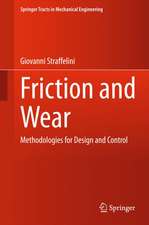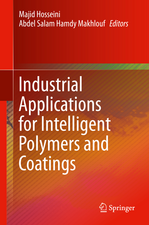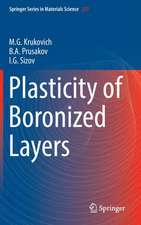Tribology: Faraday Discussions, cartea 156
Editat de Royal Society of Chemistryen Limba Engleză Hardback – 30 iun 2012
Tribology is the essential science of all interacting surfaces in relative motion. Tribology affects our lives in many direct ways and is core to future transport and energy efficient machines, the control of emissions and low maintenance renewable energy systems, to the efficacy and performance of joint implants, and the operation of mircoelectromechanical devices. This Faraday Discussion focuses on advanced computational and experimental tribology combining multiscale modelling, analytical and experimental techniques to develop a better understanding of tribological processes at the molecular, micro and nano scales and the use of this understanding to link this to micro-system performance as well as predictive models concerned with macro contact.
Din seria Faraday Discussions
- 9%
 Preț: 1180.17 lei
Preț: 1180.17 lei - 9%
 Preț: 1180.66 lei
Preț: 1180.66 lei - 14%
 Preț: 1321.37 lei
Preț: 1321.37 lei - 14%
 Preț: 1323.05 lei
Preț: 1323.05 lei - 14%
 Preț: 1321.37 lei
Preț: 1321.37 lei - 14%
 Preț: 1311.83 lei
Preț: 1311.83 lei - 14%
 Preț: 1316.41 lei
Preț: 1316.41 lei - 14%
 Preț: 1329.65 lei
Preț: 1329.65 lei - 14%
 Preț: 1306.87 lei
Preț: 1306.87 lei - 14%
 Preț: 1314.30 lei
Preț: 1314.30 lei - 14%
 Preț: 1308.50 lei
Preț: 1308.50 lei - 14%
 Preț: 1328.01 lei
Preț: 1328.01 lei - 14%
 Preț: 1319.72 lei
Preț: 1319.72 lei - 14%
 Preț: 1301.86 lei
Preț: 1301.86 lei - 9%
 Preț: 1179.23 lei
Preț: 1179.23 lei - 14%
 Preț: 1290.29 lei
Preț: 1290.29 lei - 14%
 Preț: 1310.15 lei
Preț: 1310.15 lei - 14%
 Preț: 1305.19 lei
Preț: 1305.19 lei - 14%
 Preț: 1321.37 lei
Preț: 1321.37 lei - 14%
 Preț: 1328.01 lei
Preț: 1328.01 lei - 14%
 Preț: 1323.05 lei
Preț: 1323.05 lei - 14%
 Preț: 1324.68 lei
Preț: 1324.68 lei - 14%
 Preț: 1318.04 lei
Preț: 1318.04 lei - 14%
 Preț: 1326.33 lei
Preț: 1326.33 lei - 14%
 Preț: 1332.98 lei
Preț: 1332.98 lei - 14%
 Preț: 1316.41 lei
Preț: 1316.41 lei - 14%
 Preț: 1306.02 lei
Preț: 1306.02 lei - 14%
 Preț: 1326.33 lei
Preț: 1326.33 lei - 14%
 Preț: 1310.15 lei
Preț: 1310.15 lei - 14%
 Preț: 1604.94 lei
Preț: 1604.94 lei - 14%
 Preț: 1237.50 lei
Preț: 1237.50 lei - 14%
 Preț: 1232.50 lei
Preț: 1232.50 lei - 14%
 Preț: 1241.29 lei
Preț: 1241.29 lei - 14%
 Preț: 1242.60 lei
Preț: 1242.60 lei - 14%
 Preț: 1241.29 lei
Preț: 1241.29 lei - 14%
 Preț: 1278.64 lei
Preț: 1278.64 lei - 14%
 Preț: 1288.89 lei
Preț: 1288.89 lei - 14%
 Preț: 1277.65 lei
Preț: 1277.65 lei - 14%
 Preț: 1285.76 lei
Preț: 1285.76 lei - 14%
 Preț: 1279.49 lei
Preț: 1279.49 lei - 14%
 Preț: 1287.25 lei
Preț: 1287.25 lei - 14%
 Preț: 1451.41 lei
Preț: 1451.41 lei - 14%
 Preț: 1291.06 lei
Preț: 1291.06 lei - 14%
 Preț: 1328.01 lei
Preț: 1328.01 lei - 14%
 Preț: 1321.37 lei
Preț: 1321.37 lei - 14%
 Preț: 1318.04 lei
Preț: 1318.04 lei - 14%
 Preț: 1316.41 lei
Preț: 1316.41 lei - 14%
 Preț: 1309.80 lei
Preț: 1309.80 lei - 14%
 Preț: 1318.04 lei
Preț: 1318.04 lei
Preț: 1241.29 lei
Preț vechi: 1443.36 lei
-14% Nou
Puncte Express: 1862
Preț estimativ în valută:
237.60€ • 258.17$ • 199.71£
237.60€ • 258.17$ • 199.71£
Carte disponibilă
Livrare economică 31 martie-14 aprilie
Preluare comenzi: 021 569.72.76
Specificații
ISBN-13: 9781849734479
ISBN-10: 184973447X
Pagini: 444
Dimensiuni: 163 x 237 x 33 mm
Greutate: 0.93 kg
Editura: Royal Society Of Chemistry
Seria Faraday Discussions
ISBN-10: 184973447X
Pagini: 444
Dimensiuni: 163 x 237 x 33 mm
Greutate: 0.93 kg
Editura: Royal Society Of Chemistry
Seria Faraday Discussions
Notă biografică
Faraday Discussions documents a long-established series of Faraday Discussion meetings which provide a unique international forum for the exchange of views and newly acquired results in developing areas of physical chemistry, biophysical chemistry and chemical physics. The papers presented are published in the Faraday Discussion volume together with a record of the discussion contributions made at the meeting. Faraday Discussions therefore provide an important record of current international knowledge and views in the field concerned. The latest (2010) impact factor of Faraday Discussions is 4.5
Textul de pe ultima copertă
Faraday Discussions 156 This volume focuses on recent progress in the study of tribology and brings together research from the diverse aspects of this topic. Tribology is the essential science of all interacting surfaces in relative motion, including the principles of friction, lubrication and wear. Tribology affects our lives in many direct ways and is core to future transport and energy efficient machines, the control of emissions and low maintenance renewable energy systems, to the efficacy and performance of joint implants, and the operation of microelectromechanical devices. Over the last 10 years there have been enormous advances in experimental techniques to study interfaces at the molecular scale (in situ spectroscopies, various scanning probe techniques, applications of synchotron radiation), in studies of the chemical modification of surfaces, and in theoretical and computational approaches (molecular mechanics, density functional theory) to modelling interfaces on the molecular scale. With a focus on advanced computational and experimental tribology, combining multiscale modelling, analytical and experimental techniques, we can develop a better understanding of tribological processes at the molecular, micro and nano scales and use this understanding to link this to micro-system performance as well as predictive models concerned with macro contact. The work presented touches on the following themes: Future lubricated systems Smart tribological surfaces Predictive modelling Biotribology
Cuprins
Introductory Lecture: Bio-Tribology; Papers and Discussions; Cell friction; Dynamic surface microstructural changes during tribological contact that determine the wear behaviour of hip prostheses: metals and ceramics; A stratified approach to pre-clinical tribological evaluation of joint replacements representing a wider range of clinical conditions advancing beyond the current standard; Synovial fluid lubrication of artificial joints: protein film formation and composition; General Discussion; Predictive modelling of fatigue failure in concentrated lubricated contacts; Physio-chemical hydrodynamic mechanism underlying the formation of thin adsorbed boundary films; Fate of methanol molecule sandwiched between hydrogen-terminated diamond-like carbon films by tribochemical reactions: tight-binding quantum chemical molecular dynamics study; Anticorrosion imidazolium ionic liquids as the additive in poly(ethylene glycol) for steel/Cu-Sn alloy contacts; Does ultra-mild wear play any role for dry friction applications, such as automotive braking?; On the three-term kinetic friction law in nanotribological systems; General Discussion; Hydration lubrication: exploring a new paradigm; Fabrication on ice: stick and slip; sldiing friction at soft micropatterned elastomer interfaces; Why can TiAlCrSiYN-based adaptive coatings deliver exceptional performance under extreme frictional conditions? Mechanism of ultra low friction of multilayer graphene studied by coarse-grained molecular simulation; General discussion; The origin of anti-wear chemistry of ZDDP; The mechanics of nanometre-scale molecular contacts; Semi-deterministic chemo-mechanical model of boundary lubrication; Tribology and energy efficiency: from molecules to lubricated contacts to complete machines; Complex frictional analysis of self-lubricant W-S-C/Cr coating; Polyelectrolyte brushes: a novel stable lubcrication system in aqueous conditions; General discussion; Concluding remarks; Additional Information; Poster titles; List of Participants; Index of Contributors
Descriere
This Faraday Discussion will focus on advanced computational and experimental tribology combining multiscale modelling, analytical and experimental techniques to develop a better understanding of tribological processes at the molecular, micro and nano scales.
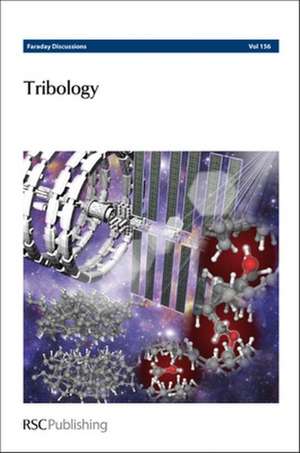






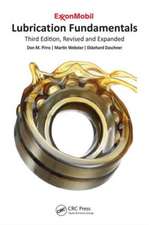

![Chemistry for Non-Specialists Course Book [With CDROM]: For Sustainable Developments](https://i2.books-express.ro/bt/9781849731126/chemistry-for-non-specialists-course-book-with-cdrom.jpg)
